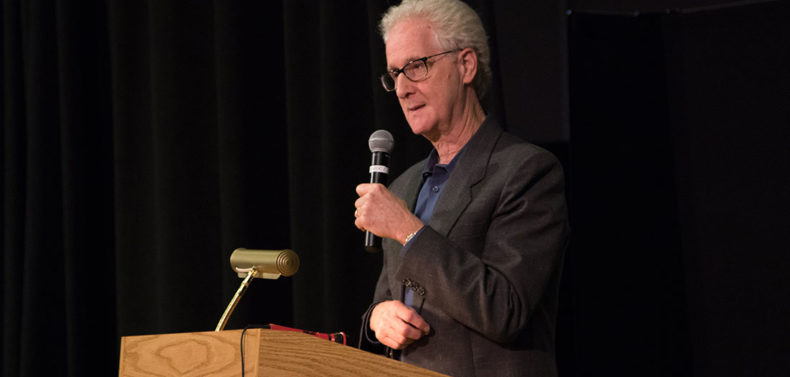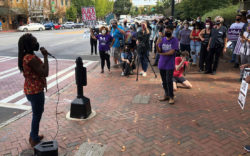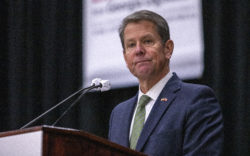In less than two months, Georgia voters will decide whether U.S. Sen. Kelly Loeffler keeps her seat, and there’s no shortage of candidates on the ballot from which voters can choose.
Richard Dien Winfield, a philosophy professor at the University of Georgia, is one of 21 candidates vying for the seat in a special election known as a jungle primary, or nonpartisan blanket primary, in which all candidates who entered the race will be on the November ballot. This process bypasses a traditional primary that narrows down the candidates to one from each party before the general election.
Running on a very progressive platform with considerably less money than candidates with higher name recognition, Winfield knows he’s a “longshot candidate.” But he believes the special format of the Senate race may work in his favor and, at the very least, he hopes to present “an alternative view of what we need to do to perfect our democracy.”
A New ‘Social Bill of Rights’
Amid the public resurgence of the Black Lives Matter movement and the widening of the income and wealth gap in the U.S., Winfield is advocating a plethora of proposals to combat economic and racial injustice.
“I think the very existence of our democracy requires that we address the fulfillment of our social rights that we have ignored to our peril,” says Winfield, who ran unsuccessfully as a Democratic candidate for U.S. Rep. Jody Hice’s seat in 2018. “Now we are facing the midnight hour, where this is the most important election in our lifetime.”
Following in the footsteps of President Franklin D. Roosevelt, Martin Luther King Jr. and U.S. Sen. Bernie Sanders, Winfield has as a key proposal a federal job guarantee, in which the federal government would offer a $20-an-hour, full-time job to every American. Winfield believes it could foster a more robust bargaining process between employers and employees and eliminate the fear of unemployment. The federal government would place workers with different skill sets into fields for which they are suited, supplying goods and services their communities need that are not supplied by private companies.
“I’m putting forward policies that I think have broad appeal because they’re core to fulfilling the American dream,” Winfield says. “It’s not a matter of restricting the private sector. I’m not a socialist. Reform the market, so that the market and the public sector work together to remove the obstacles to equal opportunity and provide economic independence and security to everyone.”
Along with this proposal, Winfield argues that an “employee bill of rights” should be established, which would require corporations to fill half of their boards of directors with non-managerial employees. It would also force companies to extend full-time benefits to part-time, contract and gig economy workers; and prohibit mandatory overtime. Additionally, Winfield supports paid leave for emergency, sickness, maternity and vacation for all U.S. employees.
“Employees have the real expertise and knowledge of what the business is actually doing, and a company will be much stronger if it takes full advantage of the knowledge and decisions of its employees,” says Winfield, who’s a member of the United Campus Workers of Georgia union. “There are all these attempts to lower taxes on corporations [and] the wealthy, as if that is going to generate investment in new production facilities. Well, that’s not going to take place if people don’t have money in their pockets.”
In regard to health care, Winfield supports creating a public single-payer health care system. However, he takes it a step further than other politicians, branding it a “Super-Medicare-for-All” single-payer system, in which all health care costs would be covered with no copays or deductibles. He believes this would help businesses save money, “because it relieves [them] of having to pay anything for the health plans of employees.”
In terms of reproductive health, Winfield is calling for “reproductive freedom,” providing women with free access to contraception, day-after pills and the opportunity for free and safe abortions. He also wants to provide child allowances of $900 per month per child to all families.
Winfield is also advocating for a similar overhaul to the legal system: “legal care for all.” This would establish public insurance for all legal fees, allowing individuals to choose a legal representative they prefer in the hopes it would allow poorer individuals to seek better representation in court and give jobs to lawyers who struggle in the private sector.
“If you don’t have the money to hire your dream team, you end up with a court-appointed lawyer or go to a legal aid clinic,” Winfield says. “In both cases, the lawyers are paid very little per client, have huge caseloads [and] no resources to hire experts to do investigations. They’re overburdened and underpaid.”
He wants to abolish for-profit prisons, for-profit probation services and cash bail. He also wants to eliminate the plea-bargaining process, as it’s “the railroad to mass incarceration.”
Winfield says he would also prioritize banning high-capacity firearms, requiring liability insurance for gun owners and mitigating the effects of climate change. “We are going to be facing a wave of economic catastrophes,” he says. “We’re already seeing it with wildfires out of control, more and more hurricanes and rising sea levels. This involves a gigantic loss of economic assets, which will be huge blows to our economic welfare. If you think COVID-19 has created a world depression unlike anything we’ve seen, just wait until the calamites of unmitigated climate change come our way.”
Winfield says his policies would reduce the need for existing welfare programs and bolster the economy and workforce, which would in turn actually save the U.S. money. He’s also calling for an overhaul of the U.S. tax system, placing the majority of the tax burden on the top 10% of U.S. income earners.
Struggle for Attention
Winfield says he has struggled to share his policy proposals with voters. For starters, the COVID-19 pandemic has limited his opportunities to connect with voters in person, causing him to rely on social media and the press. Winfield says he feels excluded by mainstream news outlets that are focusing too heavily on more prominent candidates and not sharing the spotlight with him and other lesser-known candidates. “They have to stop their boycott of every political candidate except these four establishment darlings,” he says. ‘They shouldn’t be complicit with the rule of money over our democracy.”
The most prominent contenders are U.S. Rep. Doug Collins (R-Gainesville); the Rev. Raphael Warnock, an Atlanta pastor running as a Democrat; Ed Tarver, a Democrat and former U.S. attorney; and Loeffler, a Republican who was appointed by Gov. Brian Kemp after U.S. Sen. Johnny Isakson stepped down due to health concerns in 2019. Although these candidates have among the highest name recognition and funds in the special election, Winfield says he believes none of them are particularly standing out to voters. “None of them are doing that well because they aren’t presenting much in the way of policy,” he says.” I’m trying to present what I think are genuine solutions. I have to get that message out.”
These candidates—along with Matt Lieberman, a Democrat, an entrepreneur and the son of former U.S. Sen. Joseph Lieberman—had raised and spent the most campaign money as of June 30, according to OpenSecrets. While Loeffler had raised more than $17 million, Winfield had only raised about $32,000 as of June 30. Winfield believes this is an issue, as candidates with the most money have the most opportunities to reach voters. To help candidates with less money, Winfield is calling for the public financing of all candidates running for federal and state office.
Nonetheless, Winfield says the format of this election could be advantageous for his campaign. If no candidate receives a majority of votes in a jungle primary, a runoff election between the top two candidates takes place in January.
It wasn’t until 2018 that Winfield considered running for office, he said. He grew up in Queens, NY, and studied philosophy at Yale University before he landed a full-time teaching position at the University of Georgia more than 30 years ago. After teaching for so long and writing 21 books, he decided it was time to try and apply what he had learned about economic and social justice.
“In 2018, I decided it was time to leave the ivory tower behind and see what I could do to change the political conversation,” says Winfield, who is taking a leave of absence to run, as required by UGA rules. “After Trump was elected, I think we were then, as we are now, facing a real existential crisis to our democracy—not created just by Trump, but by our failure to deal with the inadequacies of our entire system of government and its approach to freedom.”
Winfield ran as a Democratic primary candidate for Georgia’s 10th Congressional District, finishing third with 23.3 percent of the vote. Looking back, he says he largely underestimated the winner, Tabitha Johnson-Green, who was also relatively unknown.
Winfield could meet a similar fate in the 2020 election. Nevertheless, he says he’s marching forward.
Like what you just read? Support Flagpole by making a donation today. Every dollar you give helps fund our ongoing mission to provide Athens with quality, independent journalism.










